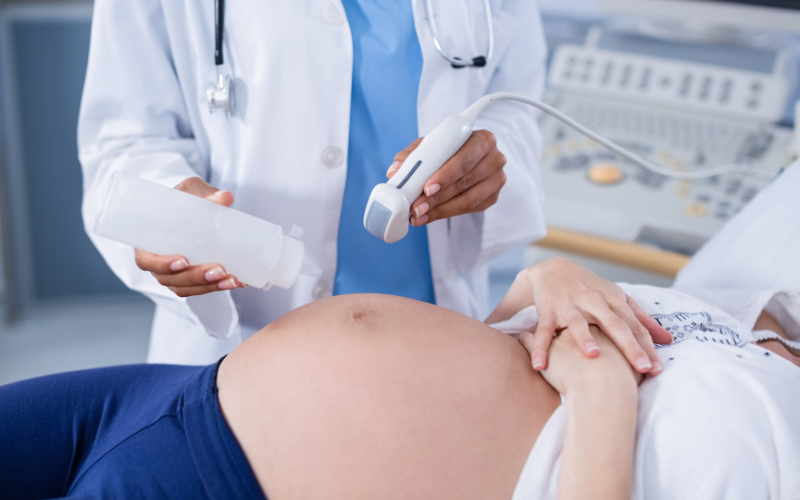
Anomaly Scan - Diagnosis of Birth Defects

Author - Dr. Madhura Phatak MBBS, MS(OBG), FRCOG, MRCOG, CCT(UK)
Consultant - Obstetrics & Gynaecology at Motherhood Hospital, Mysore
What Is An Anomaly Scan?
An anomaly scan, also known as a mid-pregnancy scan or a fetal anomaly scan, is a prenatal test that is usually performed between 18 and 21 weeks of pregnancy. It is a type of ultrasound exam that is used to check the development of the fetus and identify any potential abnormalities or problems.
Why Would I Need An Anomaly Scan?
There are several reasons why an anomaly scan may be needed. One of the main reasons is to identify any physical abnormalities in the fetus that may indicate a potential health problem. This can include problems with the brain, spine, limbs, and organs. It can also help to detect chromosomal abnormalities, such as Down syndrome, which can be associated with certain physical abnormalities.
In addition to identifying potential problems, an anomaly scan is also used to determine the position of the placenta, check the amount of amniotic fluid surrounding the fetus, and confirm the gestational age of the fetus.

When Is An Anomaly Scan Done?
An anomaly scan is usually performed by a trained sonographer, who will use a specialized ultrasound machine to create images of the fetus. The procedure is typically done in a hospital or clinic and takes between 30 and 60 minutes. At Motherhood Women & Children’s Hospital, our team of doctors will make sure you are healthy and well taken care of throughout the pregnancy by recommending the right time to do this scan and then follow-up on the same.
How Is An Anomaly Scan Done?
During the scan, the sonographer will place a small amount of gel on the woman's abdomen, which will help to conduct the ultrasound waves. They will then use a handheld probe to take images of the fetus, which will be displayed on a monitor. The sonographer will look for any physical abnormalities or problems and will also measure the size and development of the fetus to confirm the gestational age.
It is important to note that an anomaly scan is not a diagnostic test and cannot definitively determine whether or not a fetus has a specific condition. However, it can identify potential problems that may require further testing or monitoring.
Some of the birth defects that an anomaly scan may be able to detect include:
- Abnormalities in the brain: It can identify abnormalities in the structure or development of the brain, such as hydrocephalus (excess fluid in the brain), spina bifida (a birth defect in which the spinal cord does not form properly), and anencephaly (a birth defect in which a baby is born without parts of the brain and skull).
- Abnormalities in the spine: It can also identify abnormalities in the spine, such as scoliosis (a curvature of the spine) or kyphosis (an exaggerated curvature of the upper spine).
- Abnormalities in the limbs: It can detect abnormalities in the limbs, such as clubfoot (a birth defect in which the foot is twisted out of shape) or webbed fingers or toes.
- Abnormalities in the organs: It can identify abnormalities in the organs, such as kidney or heart defects.
- Chromosomal abnormalities: It can also detect chromosomal abnormalities, such as Down syndrome, which is a chromosomal condition that can be associated with certain physical abnormalities.
After the scan is complete, the sonographer will provide the expectant mother with an anomaly scan report that includes the results of the exam. If any potential problems or abnormalities are identified in the anomaly scan report, the expectant mother may be referred to a specialist for further testing or monitoring. Our team of doctors and experts at Motherhood Women & Children’s Hospital will ensure that the test results are explained and next steps are charted out for you to be at ease and comfortable with the entire process.
There are several benefits to having an anomaly scan during pregnancy:
- Identifying potential problems: It helps to identify any physical abnormalities or problems in the development of the fetus, such as abnormalities in the brain, spine, limbs, or organs. This can allow expectant mothers to receive early treatment or support, if necessary.
- Detecting chromosomal abnormalities: It can also help to detect chromosomal abnormalities, such as Down syndrome, which can be associated with certain physical abnormalities. Early detection of chromosomal abnormalities can allow expectant mothers to make informed decisions about their pregnancy and plan for the future.
- Determining the position of the placenta: It can help to determine the position of the placenta, which is important for a healthy pregnancy. If the placenta is located too low in the uterus, it can cause problems during delivery, such as bleeding or preterm labor.
- Checking the amount of amniotic fluid: It can also check the amount of amniotic fluid surrounding the fetus, which is important for fetal growth and development. If the amount of amniotic fluid is too low or too high, it can indicate a potential problem that needs to be addressed.
- Confirming gestational age: It is used to confirm the gestational age of the fetus, which is important for monitoring fetal growth and development.
What If There Is A Birth Defect?
If an anomaly scan, also known as a mid-pregnancy scan or a fetal anomaly scan, shows a potential problem or defect, the expectant mother will typically be referred to a specialist for further testing or monitoring. This may include additional scans or tests, such as amniocentesis or chorionic villus sampling (CVS), to confirm or rule out the presence of a specific condition.
If a specific condition is confirmed, the expectant mother and her healthcare provider will work together to determine the best course of action. This may include additional tests or procedures to monitor the health of the fetus, or it may involve discussing the options for managing the condition after birth.
It is also important for expectant mothers to know that many birth defects can be treated or managed after birth. While some conditions may cause serious health problems, others may not have any long-term effects on the child's health. It is important to consult with a healthcare provider to understand the specific risks and potential outcomes associated with a particular condition.
Overall, if an anomaly scan shows a potential problem or defect, it is important for expectant mothers to seek follow-up care and testing to fully understand the risks and potential outcomes associated with the condition.
Cost Of Anomaly Scan
The cost of an anomaly scan, also known as a mid-pregnancy scan or a fetal anomaly scan, in India can vary depending on a number of factors, such as the location, the facility, and the type of scan being performed. In general, the cost of an anomaly scan in India ranges from around Rs 2,000 to Rs 6,000 although it can be higher or lower depending on the specific circumstances.
It is important to note that the cost of an anomaly scan may be covered by insurance in some cases, depending on the specific policy and the reason for the scan. It is always a good idea to check with the insurance provider to understand what is covered under the policy.
Overall, the cost of an anomaly scan in India can vary, and it is important for expectant mothers to discuss the costs with their healthcare provider and insurance provider to understand what they can expect to pay for this important prenatal test.
At Motherhood Hospitals, we have a team of experienced super specialists backed by the latest in infrastructure and facilities. We have the best Gynaecologist specialists in Mysore, Mysuru. We are experts in handling complex deliveries, gynaecological, and other surgeries including a range of laparoscopic surgeries. Do take an appointment with the best Maternity hospital in Mysore, Mysuru at a centre closest to you. Meet with our doctors who will assist you with all the tests such as the anomaly scan so that you rule out any abnormalities. To know more about the cost of anomaly scan or processes and results, you can contact Motherhood Women & Children’s Hospital on 96203-96203.
If you wish to get in touch with Dr. Madhura Phatak, please book your appointment here
Related Blogs

Understanding Gestational Diabetes: Insights from Dr Shruthi Kalagara
Read More
Urinary Tract Infection (UTI) in Pregnancy
Read More
Early Pregnancy Care for New Pregnant Women: Expert Advice | Motherhood Hospitals
Read More
Body Positivity Tips Post C Section (Cesarean Delivery)
Read More
Vaginoplasty: Procedure, Cost, Risks & Benefits, Recovery
Read More
The Digital Dilemma: Exploring the Medical Implications of Technology on Child Development
Read More
How To Relieve Menstrual Cramps? - 8 Simple Tips
Read More
Benefits of Consuming Folic Acid Tablets For Pregnancy/During Pregnancy
Read More
Navigating Radiology: Ensuring Safe Imaging During Pregnancy
Read More
Navigating Radiological Tests During Pregnancy: Ensuring Safety for Mother and Child
Read MoreRequest A Call Back
Leave a Comment:
View Comments
Previous
Next
HELLO,
Stay update don our latest packages, offer, news, new launches, and more. Enter your email to subscribe to our news letter


 Toll Free Number
Toll Free Number








No comment yet, add your voice below!